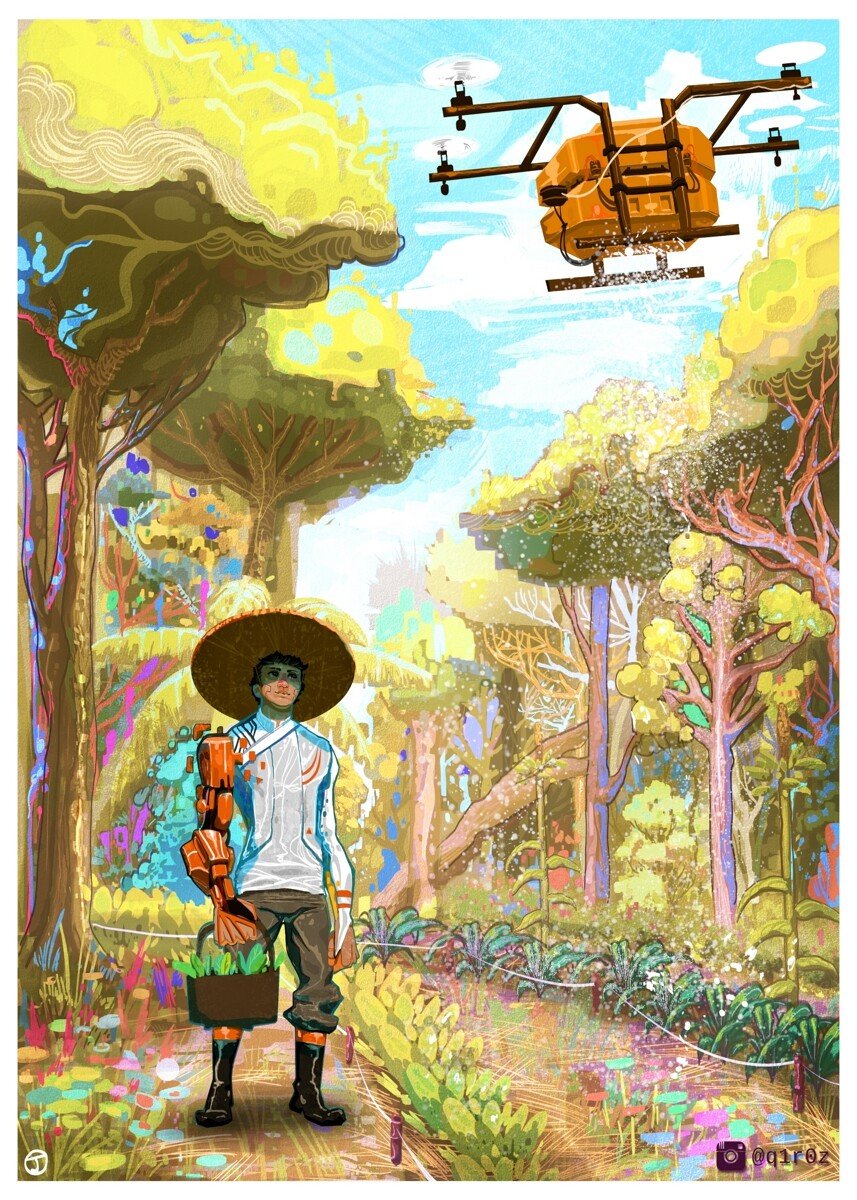Hope and Solarpunk
Hope is an affect (aka feeling that drives action) that I’ve been thinking about for a while, ever since I was a graduate student. “Hope” is a word that gives people warm fuzzy feelings when they read it or use it, but I’m not sure that it’s very well understood or theorized in this day and age. Because most people equate the concept of hope with that of naïve positivity and intentional ignorance of “reality”.
Following hot on the heels of last week’s discussion of naïveté in solarpunk, I want to address the idea of hope head-on. I’ve before quoted this same passage from the last episode of the podcast “Secret Feminist Agenda” but I’m gonna do it again because it is super relevant to the way I’m thinking about hope as coming in different types. In the episode, host Dr Hannah MacGregor is in conversation with Dr Eugenia Zuroski, and observes that uncritical expressions of hope “[come] so often packaged in … toxic positivity” that insists that “we are all in this together” and that “we will get through this terrible situation,” yet for many people (especially people of colour and queer people) “we don’t always get through this” (11:52-12:05). In response, Dr Zuroski makes a clear distinction between wishful thinking and “radical hope” as a hope that is earned: the kind of hope that marginalized people such as BIPOC, LGBTQ2S+ and disabled people have been “earning all along … just by living under conditions that are designed to deprive you of … hope for yourself … for your own survival, your own flourishing, and your own future” (13:52-15:25).
“ you can’t just hope out of nowhere. You have to do the work of understanding… where we’ve come from, where we all are right now, where you are in the middle of all that, then you can start to…build your hope”
When I talk about hope as an expression of wishful thinking, I’m thinking of the example that Dr Zuroski gives in that same episode, of someone prefacing their opinion with the phrase “I hope this isn’t racist,” and then going and saying something egregiously racist (17:21). She points out how in this example the speaker’s terminology uses “hope” to express the wish that their statement were not racist, because they cannot recognize themselves as racist. But, as anyone who’s been a captive in that particular conversation can attest, that wish is contrary to the actual reality of the situation; as Zuroski says, “you can’t hope for realities not to exist” (17:21); hope is not an applicable word in this situation. Zuroski goes on to say that in order for marginalized people and their allies to access truly radical hope, it is necessary to dedicate time to “thinking about temporality … your relationship to histories [and] to the present …. and let that inform how you build a relationship to the future, which is what hope is…. hope is the name for relating to a future of some kind” and that “you can’t just hope out of nowhere. You have to do the work of understanding… where we’ve come from, where we all are right now, where you are in the middle of all that, then you can start to…build your hope” (18:03). Dr MacGregor agrees that positive change has to be intrinsically tied to will and to action, not an ephemeral wish for a better future to abstractly happen, somehow.*
I’m using the word “abstract” here as an intentional nod to the work of José Esteban Muñoz on queer utopias, who contrasts a concrete “queer” version of utopia with an abstract utopia, one that’s made up of unrealistic dreams that have no grounding in “reality.”** I think that most people assume that solarpunk hope is the abstract, wishful thinking kind.
I am of the opinion that that is very far from the truth of it, however. What draws me to solarpunk is the way it conceives of hope stripped of its naïveté: eyes open to the devastation of the climate crisis, institutionalized racism, violent misogyny, rapaciousness of capitalism, the fact we’re witnessing a genocide and even though we are lobbying our governments, attending protests, and organizing boycotts, we’re unable to make any tangible move towards stopping what is happening. Is this a result of an eye-for-an-eye worldview, cynical capitalist greed trumping any human compassion, corporate and governmental hypocrisy, the legacy of colonialism, the systemic long-standing disinformation about the reality of the situation, run-of-the-mill racism, or all of it at once? And does it matter what the origin of violence is when the violence is still ongoing? All of this can be overwhelming. It takes a lot out of one to have their senses wide open to what is happening in the world and still try to choose to do what is best in the situation.
((A word of caution, there is a type of hope that can trap one into a despairing situation. It’s what Berlant calls “stupid optimism”. It’s the dark side of hope, not an empowering or active type of hope, but another expression of wishful thinking in direct contrast to the reality of the world - in which you have no control over the sequence/flow of events. Instead, the more that you believe the world to operate otherwise, along these abstract, wishful lines and rules that have framed this situation for you in the imagination, the more trapped one becomes, succumbing to a powerlessness within a fantasy over which you once had complete control, as you are the one who made it.))
I’ve found that if I take a pickaxe to the solarpunk aesthetic and rip it back, underneath the best examples I find throbbing, raw hope, the ability to look at our current world and deliberately choose a better path, often to the detriment of the self. It takes a lot out of one to have their senses wide open to what is happening in the world (or even on the “small scale” of violence in their community) and still leave themselves open to further wounding, sometimes by the very people or systems within which the solarpunk individual is trying to help.
What this hope looks like is the choice to be positive. The drive to choose against all odds to work grimly towards the betterment of humanity even if that solarpunk feels that humanity doesn’t deserve it.*** To me, the best examples of the solarpunk aesthetic are artistic expressions of that hope-as-a-choice despite everything.
Jose Queiroz’s work “Agroforestry” is often given as a demonstration of very good solarpunk art. It is both stunningly beautiful and evocative of a future in which humanity lives with and tends nature and integrates technology into that lifestyle fairly seamlessly without it degrading the natural world. It centres a person of colour that we might in our time describe as disabled, but it’s clear they are perfectly capable and content. It takes Amazofuturism and weds it to solarpunk in a bright and wonderful way.
I’m not an art critic, but to humanities scholars, the world is a text to be analyzed, yadda yadda, so I can’t help but read it thusly. I don’t see the art of solarpunk as pure escapism but as a concrete expression of the belief that there are beautiful things in this world, they are worth celebrating and, most importantly, hope that future humans will have more time to incorporate making, appreciating, or simply existing around beautiful things in their lives.
Solarpunk art as an expression of hope in humanity’s ability to create and appreciate art not just in the present but in a future where art is much more ubiquitous is not abstract, to me. It directly relates to art programs in the present for kids in underfunded communities, for humanities education for community members, for encouraging art daycamps and in schools. It relates directly to the fight to preserve art that exists and art-making in the present, with an eye to the future.
As Marwan Makhoul writes,
In order for me to write poetry that isn't political,
I must listen to the birds
and in order to hear the birds
the warplanes must be silent
To me, the solarpunk version of hope can translate into direct action for peace. To me, that is not abstract. This type of hope - what I call a solarpunk hope - is a direct motivator of positive action.
What do you think, though? Am I going in the right direction, or off the beaten path entirely? How do you think of hope and solarpunk?
—
*I definitely ripped most of this section from a previous essay of mine published with the Science Fiction Review Association; I had solarpunk in mind when I was writing that piece though the argument was more about traditional ideas of utopia than the genre of solarpunk per se. So now I get to apply it to solarpunk, which is cool.
**For more of an explanation on why “reality” is in quotes here, I’d recommend a listen to our episode with Dr Joey Ayoub on what exactly is “realistic” when it comes to thinking about the future and incorporating solarpunk ideals into it.
***I know a few people who say they hate other humans and yet are some of the kindest, most gracious and generous humans in their interactions with others; imo they don’t hate other people, they hate the way that other people are forced to act under systems that have fucked them up so badly they cannot locate that graciousness in human interactions in themselves. I have begrudgingly come to realize that people are generally good, if you take away the trauma and shittiness they may have had to deal with throughout their lives that shapes them into cruel people or even rewards them for it. My Calvinist forbears are turning in their graves.

